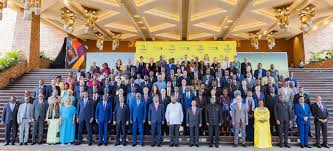President William Ruto of Kenya has issued a clarion call to African governments, urging an amplified investment in regional agricultural infrastructure, research and innovation, and the expedited dissemination of technological advancements. This appeal underscores the critical need for a unified approach towards building robust and resilient agricultural systems across the continent. He emphasized the importance of synchronizing international support with Africa’s transformative agricultural agenda, ensuring that resources are directed towards areas where they can yield the most significant impact. Ruto’s message stresses that this pivotal moment demands a bold and transformative commitment to revolutionizing Africa’s food systems, laying the groundwork for a future of sustainable and prosperous agriculture. Speaking at the African Union Extraordinary Summit on the Post-Malabo Comprehensive Africa Agriculture Development Programme (CAADP) in Kampala, Uganda, President Ruto reiterated the belief that these strategic interventions are the cornerstone for uplifting livelihoods, protecting the environment, and fulfilling the fundamental obligation of nourishing Africa’s population.
The Comprehensive Africa Agriculture Development Programme (CAADP) encapsulates a powerful vision for the continent – a future free from hunger, where every community enjoys access to safe and nutritious food. This vision extends beyond mere sustenance, encompassing environmentally responsible agricultural practices and an agricultural sector that generates employment and economic prosperity for millions. Ruto’s address served as a reminder of the attainability of this vision through concerted efforts and a resolute commitment to the CAADP framework. The summit, attended by other prominent African leaders including Presidents Yoweri Museveni of Uganda, Joào Lourenço of Angola, and Moussa Faki Mahamat, Chairperson of the African Union Commission, served as a platform for collaborative discussions and the formulation of actionable strategies. The culmination of the summit saw the adoption of the Kampala Declaration, a successor to the Malabo Declaration whose implementation period concludes this year. This new declaration signifies a renewed commitment to accelerating agricultural transformation across Africa.
President Ruto pledged Kenya’s commitment to integrating the Kampala Declaration within the second phase of its Agriculture Sector Transformation and Growth Strategy (2019-2029) and the National Agriculture Investment Plan (2025-2029). Kenya’s strategic focus centers on boosting agricultural production and productivity, reducing reliance on imports, minimizing post-harvest losses, bolstering warehousing infrastructure, and promoting export-oriented manufacturing within key agricultural value chains. These initiatives aim to create a more efficient and resilient agricultural sector capable of meeting domestic needs and contributing to economic growth. Ruto highlighted the positive impact of these interventions, emphasizing the improved access to essential inputs for millions of Kenyan farmers, leading to significant productivity gains. These tangible results demonstrate the transformative potential of implementing strategic agricultural policies. Kenya’s success in exceeding the African Union’s irrigation development target, expanding irrigated land by 147% since the Malabo Declaration, further underscores the country’s commitment to agricultural advancement.
President Museveni of Uganda echoed the call for agricultural modernization, urging a shift towards modern practices and reduced fragmentation within the sector. He emphasized the importance of commercial irrigation and the cultivation of disease- and drought-resistant crops as key strategies for enhancing agricultural resilience and productivity. Museveni cited Uganda’s success in transforming its agriculture into a money economy, contributing to poverty reduction, as a testament to the potential of a modernized agricultural sector. He further emphasized Africa’s abundant water resources, particularly the vast volumes of the Congo River, which, if properly harnessed, could be instrumental in eradicating hunger in water-scarce regions. This highlights the importance of strategic water management and infrastructure development to unlock Africa’s agricultural potential.
President Lourenço of Angola underscored the ambitious targets of Africa’s agricultural development program, which aims for a 6% annual growth rate, with a commitment from African Union member states to allocate at least 10% of their national budgets to the agricultural sector. This emphasizes the need for significant investment and prioritization of agriculture as a driver of economic growth and development. Chairperson Faki highlighted the challenge of youth disengagement from agriculture and the increasing trend of urban migration, recognizing these factors as contributing to low food production. Addressing this demographic challenge and attracting young people back to agriculture through innovative strategies and opportunities is crucial for ensuring the long-term sustainability of the sector.
The Kampala summit represents a critical juncture for Africa’s agricultural transformation. The shared commitment to enhancing agricultural infrastructure, fostering innovation, and promoting sustainable practices underscores the collective determination to build a food-secure and prosperous future for the continent. The Kampala Declaration provides a renewed framework for action, urging increased investment, strategic policy implementation, and a focus on empowering farmers and building a resilient and sustainable agricultural sector. The emphasis on regional cooperation, technological advancements, and youth engagement signifies a comprehensive approach to tackling the complex challenges facing African agriculture and realizing the vision of a hunger-free continent.














